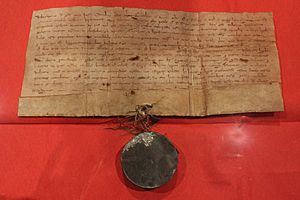Town privileges facts for kids

Town privileges were like special rulebooks or agreements given to towns and cities a long, long time ago, during the Middle Ages. Imagine a king or queen, or another powerful ruler, giving a town permission to do certain things that other places couldn't. These special rights helped towns grow and become important centers for trade and living.
Contents
What Were Town Privileges?
Town privileges were official documents, often called royal charters. They were like a contract between a powerful ruler and a town. These documents gave the town and its people unique freedoms and powers. It was a big deal for a town to get these privileges because it meant they could manage many of their own affairs.
Why Were These Privileges Important?
Getting town privileges was a huge step for any town. It meant they had more control over their daily lives and could become more prosperous. These rights helped towns become strong and independent. They were a sign that the town was growing and had the support of a powerful ruler.
What Rights Did Towns Get?
Town privileges usually included several key rights:
- Market Rights: Towns could hold their own markets. This was super important because markets were where people bought and sold goods, making the town a busy place for trade.
- Forming Guilds: People in the same job, like bakers or shoemakers, could form groups called guilds. Guilds helped set rules for their craft and protected their members.
- Self-Governance: Towns gained the freedom to choose their own local leaders and make their own local laws. This meant they didn't always have to wait for the king or queen to decide everything for them. They could handle many local issues themselves.
- Special Rights for Citizens: People who lived permanently in the town and were recognized as citizens, often called Burghers, received special rights. These rights were not given to everyone and made living in a privileged town very desirable.
Famous Examples of Town Privileges
Many towns across Europe received these special rights. Over time, some of these privilege systems became very well-known and were even copied by other towns. In the area that is now modern-day Germany, some famous examples included:
- The Lübeck law: This set of rules was used by many towns around the Baltic Sea.
- The Magdeburg rights: These were popular in Central and Eastern Europe.
- The Kulm law: This was used in parts of what is now Poland.
These examples show how important and widespread town privileges were in shaping cities and towns during the Middle Ages.

